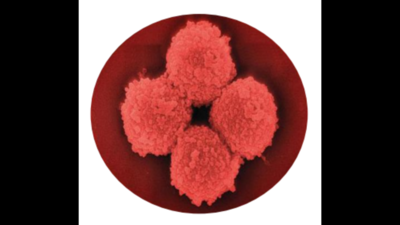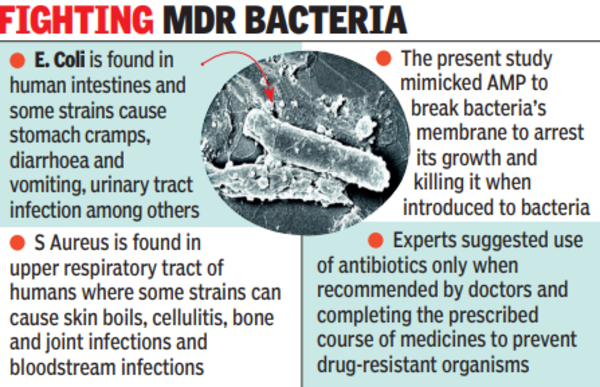- News
- City News
- ahmedabad News
- 'Polymers can tackle multidrug-resistant bacteria'
'Polymers can tackle multidrug-resistant bacteria'

Difficult to treat infections are a reality for many, as multidrug resistant pathogens have emerged where conventional antibiotics are not working at all
AHMEDABAD: The medical world, nationally and globally, has been increasingly red-flagging growing antibiotic resistance which leaves them with fewer options to tackle the menace of multidrug resistant bacteria. A doctoral researcher at IIT Gandhinagar (IIT-Gn) has claimed to have developed antibiotic polymers which offer a cheaper alternative to antimicrobial peptides used to curb the growth of bacteria.
Anju Tyagi, a scholar in chemistry discipline, was awarded her PhD earlier this year for her thesis 'Membrane-targeting methacrylamide-based antibiotic polymers to combat drug-resistant bacteria: synthesis, characterization, and investigation of biological properties'.

"These polymers which mimic the host antimicrobial peptides (AMP) for treatment are a potential pharmaceutical candidate for the development of inexpensive biocompatible membrane-active antimicrobial polymeric materials due to their easy synthesis and high antibacterial efficacy," Tyagi told TOI.
Explaining the premise, she said that excessive use of antibiotics in both humans and animals has raised microbial resistance over the decades. The resistance occurs when antibiotics lose their ability to kill or prevent growth of microorganisms like bacteria and fungi. "Difficult to treat infections are a reality for many, as multi-drug resistant pathogens have emerged where conventional antibiotics are not working at all," she said.
Tyagi said that while AMPs are a potential option under investigation, there are challenges such as chemical and medication instability and high manufacturing cost that prohibit its wider application. The polymers developed during the research mimics the mechanism that prohibits the growth of bacteria. For the study, she took two of the most prevalent bacteria - E. Coli and S. Aureus - in humans that cause an array of health issues.
'It opens new avenue to fight multidrug resistant bacteria'
The bacteria was exposed to the polymers for a period of 30 days. The results are encouraging with the minimum inhibitory concentration (MIC) found to be within satisfactory range. MIC indicates minimum concentration of an antimicrobial polymer to prevent or kill bacterial growth," said Anju Tyagi. "The polymers kill bacterial cells by disrupting cytoplasmic membrane, preventing cell proliferation. No significant resistance to the polymers was observed. It opens up a new avenue to fight multidrug resistant bacteria with membrane targeting polymers."
City-based experts said that antimicrobial resistance is already a major issue. Dr Parth Desai, COO of KD Hospital, said that the phenomenon is not only causing mortality across the globe, but is becoming a major issue primarily due to practices such as over-the-counter medication and stopping the medicines when the patients feel better. "A coordinated response is required to ensure that we can reduce the drug-resistant infections," he said.
Experts also cited Indian Council for Medical Research (ICMR) of 2021 where sustained increase in drug-resistant pathogens was found which was difficult to treat with available medicines.
Anju Tyagi, a scholar in chemistry discipline, was awarded her PhD earlier this year for her thesis 'Membrane-targeting methacrylamide-based antibiotic polymers to combat drug-resistant bacteria: synthesis, characterization, and investigation of biological properties'.

"These polymers which mimic the host antimicrobial peptides (AMP) for treatment are a potential pharmaceutical candidate for the development of inexpensive biocompatible membrane-active antimicrobial polymeric materials due to their easy synthesis and high antibacterial efficacy," Tyagi told TOI.
Explaining the premise, she said that excessive use of antibiotics in both humans and animals has raised microbial resistance over the decades. The resistance occurs when antibiotics lose their ability to kill or prevent growth of microorganisms like bacteria and fungi. "Difficult to treat infections are a reality for many, as multi-drug resistant pathogens have emerged where conventional antibiotics are not working at all," she said.
Tyagi said that while AMPs are a potential option under investigation, there are challenges such as chemical and medication instability and high manufacturing cost that prohibit its wider application. The polymers developed during the research mimics the mechanism that prohibits the growth of bacteria. For the study, she took two of the most prevalent bacteria - E. Coli and S. Aureus - in humans that cause an array of health issues.
'It opens new avenue to fight multidrug resistant bacteria'
The bacteria was exposed to the polymers for a period of 30 days. The results are encouraging with the minimum inhibitory concentration (MIC) found to be within satisfactory range. MIC indicates minimum concentration of an antimicrobial polymer to prevent or kill bacterial growth," said Anju Tyagi. "The polymers kill bacterial cells by disrupting cytoplasmic membrane, preventing cell proliferation. No significant resistance to the polymers was observed. It opens up a new avenue to fight multidrug resistant bacteria with membrane targeting polymers."
City-based experts said that antimicrobial resistance is already a major issue. Dr Parth Desai, COO of KD Hospital, said that the phenomenon is not only causing mortality across the globe, but is becoming a major issue primarily due to practices such as over-the-counter medication and stopping the medicines when the patients feel better. "A coordinated response is required to ensure that we can reduce the drug-resistant infections," he said.
Experts also cited Indian Council for Medical Research (ICMR) of 2021 where sustained increase in drug-resistant pathogens was found which was difficult to treat with available medicines.
FOLLOW US ON SOCIAL MEDIA
FacebookTwitterInstagramKOO APPYOUTUBE
Start a Conversation
end of article









